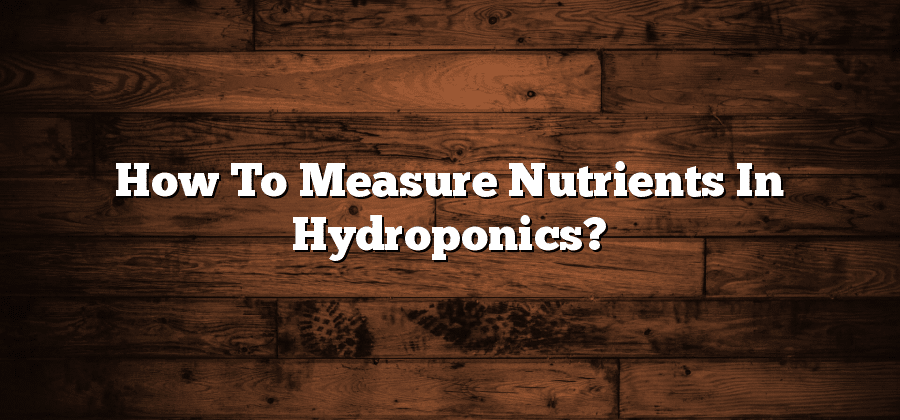Importance of Accurate Nutrient Measurement
Accurate nutrient measurement is crucial for the success of any hydroponic system. It ensures that plants receive the correct balance of essential nutrients they need to grow and thrive. Without accurate measurement, there is a risk of over or under-feeding plants, which can lead to nutrient deficiencies or toxicities. This can have a detrimental impact on plant growth, yield, and overall crop quality.
In addition to supporting plant health, accurate nutrient measurement is also vital for resource management. By knowing exactly what nutrients are present in the solution, growers can avoid wastage and optimize their nutrient use efficiency. This not only minimizes costs but also reduces the environmental impact of nutrient runoff. Therefore, investing in reliable testing equipment and regularly monitoring nutrient levels is a fundamental practice for any hydroponic farmer. It allows for precise control over the nutrient solution and ultimately contributes to the long-term success of the system.
Understanding Essential Nutrients for Hydroponics
Hydroponics is a method of growing plants without soil, where the nutrients necessary for plant growth are provided through a nutrient solution. Essential nutrients are those elements that are required by plants for healthy growth and development. These nutrients can be divided into two categories: macronutrients and micronutrients.
Macronutrients are required in large quantities and include elements such as nitrogen, phosphorus, and potassium. These nutrients are crucial for the plant’s overall growth, energy production, and the formation of strong roots and shoots. On the other hand, micronutrients are required in smaller amounts, but they are equally important for the plant’s health. These include elements such as iron, zinc, and manganese, which are involved in various biochemical processes within the plant, such as enzyme activity and photosynthesis.
Understanding the essential nutrients for hydroponics is essential for ensuring the plants receive the necessary elements for optimal growth. By providing the correct balance of macronutrients and micronutrients, hydroponic growers can support healthy plant growth throughout all stages of the plant’s life cycle. Furthermore, regular monitoring and adjustment of the nutrient solution to maintain optimal nutrient levels can help prevent deficiencies or toxicities that can impede the plants’ growth and productivity.
In conclusion, a thorough understanding of the essential nutrients required for hydroponics is critical for successful plant growth. By providing the right balance of macronutrients and micronutrients and regularly monitoring the nutrient solution, hydroponic growers can ensure their plants receive all the elements necessary for healthy development. In the following sections, we will explore different aspects of nutrient testing and analysis, which are crucial for maintaining accurate nutrient levels in a hydroponic system.
Selecting the Right Nutrient Testing Equipment
Nutrient testing equipment plays a vital role in maintaining the optimal growth conditions for hydroponic plants. However, selecting the right equipment can be a daunting task for many growers. With a plethora of options available in the market, it is crucial to choose equipment that is accurate, reliable, and easy to use.
When it comes to selecting nutrient testing equipment, accuracy should be the foremost consideration. Investing in equipment that provides precise measurements ensures that you have a clear understanding of the nutrient levels in your hydroponic system. This, in turn, allows you to make informed decisions about adjusting the nutrient solution to meet the specific needs of your plants. Additionally, reliable equipment helps prevent the risk of nutrient imbalances, which can lead to stunted growth or even plant mortality. Lastly, opting for user-friendly equipment saves you time and effort, as it reduces the complexity associated with the testing process. Overall, selecting the right nutrient testing equipment is crucial for achieving optimal growth and maximizing the potential of your hydroponic system.
Calibrating and Maintaining Testing Instruments
One crucial aspect of ensuring accurate nutrient measurement in hydroponics is calibrating and maintaining testing instruments. These instruments, such as pH meters and conductivity meters, play a vital role in determining the nutrient levels in the water and nutrient solutions. However, if they are not properly calibrated, the measurements obtained can be unreliable, leading to incorrect adjustments in the nutrient solution. Therefore, it is essential to regularly calibrate these instruments to ensure their accuracy and reliability.
Calibrating the testing instruments involves comparing their readings to a known standard solution. By adjusting the instruments’ settings according to the readings of the standard solution, you can ensure that they are accurately measuring the nutrient levels. It is recommended to calibrate the instruments before each use or, at the very least, once a week to maintain their accuracy. Additionally, it is crucial to follow the manufacturer’s instructions for maintaining the testing instruments, which often include proper cleaning, storage, and replacing worn-out parts. Regular maintenance will not only prolong the lifespan of these instruments, but it will also ensure that they continue to provide accurate readings, allowing for more precise nutrient adjustments in hydroponic systems.
Conducting Water and Nutrient Solution Analysis
When it comes to hydroponic farming, conducting regular water and nutrient solution analysis is a vital practice. By analyzing the composition of the water and nutrient solution, growers can ensure that their plants receive the necessary nutrients for healthy growth. This analysis helps in identifying any imbalances or deficiencies in the solution, allowing for timely adjustments to be made to maintain optimal plant nutrition.
Conducting water and nutrient solution analysis involves a series of steps. Firstly, water samples are collected from the hydroponic system and tested for various parameters such as pH, electrical conductivity (EC), and total dissolved solids (TDS). These measures provide crucial information regarding the water quality and its suitability for hydroponic cultivation. In addition, nutrient solution samples are taken and analyzed to determine the nutrient concentrations present. This analysis helps growers to monitor the nutrient levels and adjust them as needed to meet the specific requirements of different plant stages.






